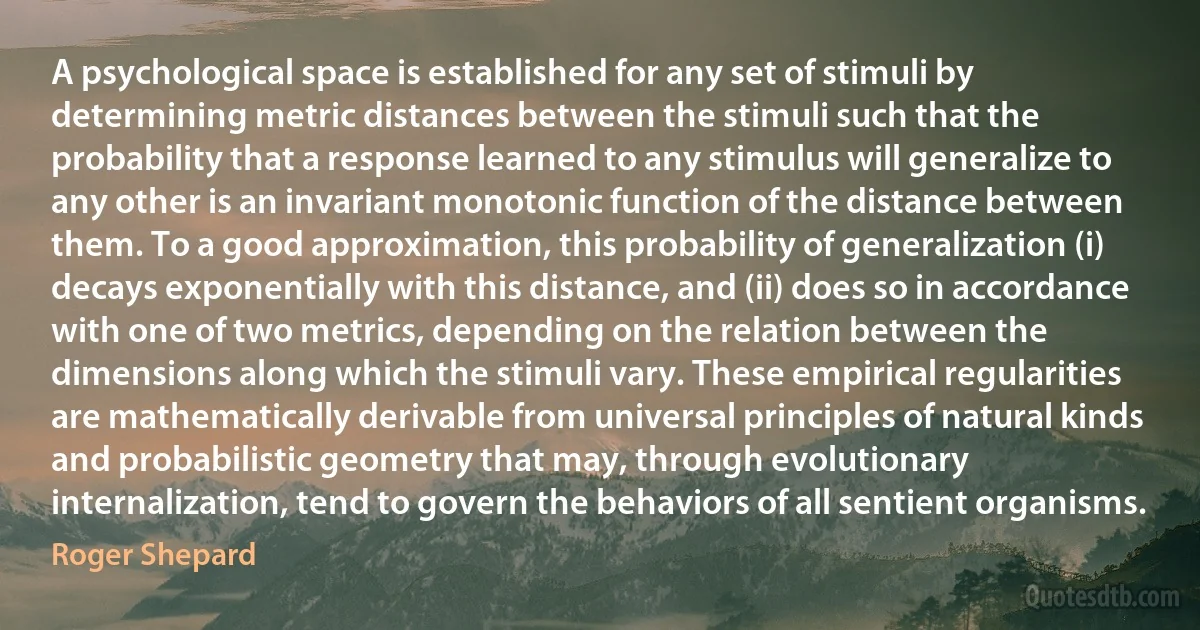
A psychological space is established for any set of stimuli by determining metric distances between the stimuli such that the probability that a response learned to any stimulus will generalize to any other is an invariant monotonic function of the distance between them. To a good approximation, this probability of generalization (i) decays exponentially with this distance, and (ii) does so in accordance with one of two metrics, depending on the relation between the dimensions along which the stimuli vary. These empirical regularities are mathematically derivable from universal principles of natural kinds and probabilistic geometry that may, through evolutionary internalization, tend to govern the behaviors of all sentient organisms.
Roger ShepardRelated topics
approximation distance generalization geometry good govern invariant metric natural probability sentient set space stimulus universal internalization metricsRelated quotes
If Korzybski cannot be said to have established an empirical science, what then has he done? He has pointed a way toward the establishment of such a science. He was a precursor of an intellectual revolution which is just now beginning and which promises to match that of the Renaissance. If Korzybski is seen in this role, then the question of his originality or erudition is not important. He might have something of a dilettante in him. He might have pretended to have more specialized knowledge than he actually had. Great portions of his outlook might be found in the works of more modest and more meticulous workers, That is not important. He was a man of vision and an apostle. Such men are all too rare in our age of specialization.

Anatol Rapoport
I am not insensible to natural beauty, but my emotional joys center on the improbable yet sometimes wondrous works of that tiny and accidental evolutionary twig called Homo sapiens. And I find, among these works, nothing more noble than the history of our struggle to understand nature-a majestic entity of such vast spatial and temporal scope that she cannot care much for a little mammalian afterthought with a curious evolutionary invention, even if that invention has, for the first time in some four billion years of life on earth, produced recursion as a creature reflects back upon its own production and evolution. Thus, I love nature primarily for the puzzles and intellectual delights that she offers to the first organ capable of such curious contemplation.

Stephen Jay Gould
Supernatural agents are critical components of all religions but not of all ideologies. They are, in part, by-products of a naturally selected cognitive mechanism for detecting agents-such as predators, protectors, and prey-and for dealing rapidly and economically with stimulus situations involving people and animals. This innate releasing mechanism is trip-wired to attribute agency to virtually any action that mimics the stimulus conditions of natural agents: faces on clouds, voices in the wind, shadow figures, the intentions of cars or computers, and so on. Among natural agents, predators such as snakes are as likely to be candidates for deification as are protectors, such as parent-figures.

Scott Atran
This connection, at once semantic and conceptual, between unorthodoxy and sodomy, was firmly established during the late Middle Ages, and has never been severed. It is as strong today as it was six hundred years ago. To be stigmatized as a heretic or bugger in the fourteenth century was to cast out of society. Since the dominant ideology was theological, religious deviance was considered so grave an offense as to render the individual a nonperson. Whatever redeeming qualities he might have had counted for naught. The sin of heresy eclipsed all contradictory, personal characteristics, just as the teachings of God and the Church eclipsed all contradictory empirical observations. The disease called "mental illness”-and its subspecies "homosexuality”-plays the same role today.

Thomas Szasz
The most promising lines of development of theory in the sociological and most immediately related fields, particularly the psychological and cultural, therefore, seem to be two-fold. One major direction is the theoretical elaboration and refinement of structural-functional analysis of social systems, including the relevant problems of motivation and their relation to cultural patterns. In this process, the structure of social action provides a basic frame of reference, and aspects of it become of direct substantive importance at many specific points. The main theoretical task, however, is more than a refinement of the conceptual scheme of the presently reprinted book - it involves transition and translation to a different level and focus of theoretical systematization.

Talcott Parsons
